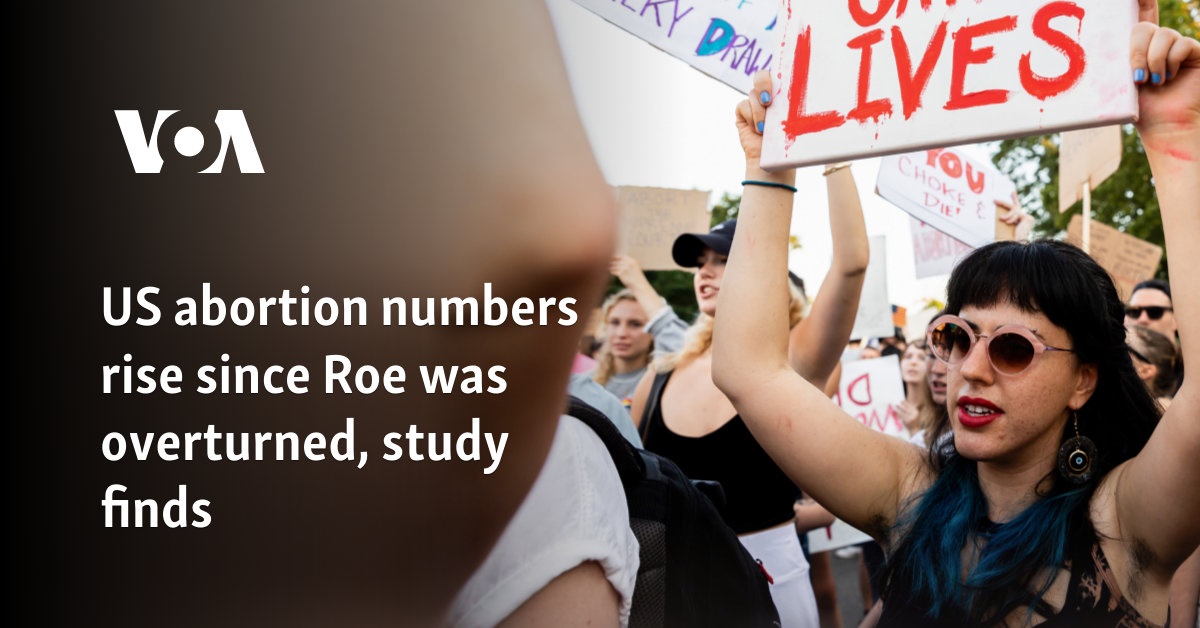Abortions were slightly more common in the United States in the first three months of this year than they were before the Supreme Court overturned the Roe v. Wade decision, paving the way for states to implement bans, according to a report released Wednesday.
A key reason for the increase is that some Democratic-controlled states have passed laws protecting doctors who treat patients via telemedicine in places where abortion is banned, according to the quarterly #WeCount report from the Society of Family Planning, which advocates for abortion access.
The data comes ahead of the November election, when abortion rights advocates hope the issue will drive voters to the polls. In some states, voters will have the opportunity to enshrine or reject abortion protections at the state level.
The aftermath of the Supreme Court’s June 2022 ruling in Dobbs v. Jackson Women’s Health Organization has changed the way abortions are performed across the country. #WeCount data, collected in a monthly survey since April 2022, shows how those who have and seek abortions have adapted to the changing laws.
The survey found that abortion rates dropped to nearly zero in states that banned abortion at all stages of pregnancy. In states that banned abortion after six weeks of pregnancy, abortion rates dropped by about half, before many women know they are pregnant. Fourteen states ban abortion at all stages of pregnancy with some exceptions, and four more ban it after about six weeks of pregnancy.
Abortion rates increased in places where they are legal later in pregnancy, particularly in states like Illinois, Kansas and New Mexico that border states where abortion is illegal.
Abortion pills and telemedicine play a key role. In March, doctors in states with health care provider protection laws used telemedicine to prescribe abortion pills to nearly 10,000 patients in states with telemedicine abortion bans or restrictions—that’s about one in 10 abortions in the United States.
Last year, some Democratic-led states passed laws protecting medical professionals who prescribe abortion pills via telemedicine.
“It takes the pressure off the hospitals,” said Ushma Upadhyay, a professor at the University of California, San Francisco School of Medicine and co-leader of #WeCount. “It creates more space for the people who come to the hospitals.”
Abortion opponents say the fight over the abortion drug mifepristone is not over after the Supreme Court narrowly ruled that access to the drug would remain intact for now. But so far there have been no legal challenges to the protection laws.
The latest edition of the survey covers the first three months of this year. In January, more than 100,000 abortions were counted nationwide in a single month for the first time since the survey began.
Before the Shield Laws came into effect and #WeCount began counting, people were still getting pills in places where the ban was in place.
Upadhyay said that even before Roe was overturned, demand for abortions was greater than availability. She also said that despite the changing patterns, some women continue pregnancies that they would have terminated if they could.
One of the states where abortion rates increased was Florida. That changed in April when a ban after the sixth week of pregnancy went into effect. The data does not yet reflect that change.
The policy could change again with a vote in November. It would legalize abortion up to viability, which generally means about 23 or 24 weeks into the pregnancy. To add it to the state constitution, it would need at least 60 percent approval.
A dissenting voice comes from Mia Adkins, a 20-year-old senior at Florida International University. She said the overturning of Roe and changes in Florida’s law have brought more attention to abortion and strengthened her belief that there must be limits.
“Instead of pushing to legalize abortion later in pregnancy, we should be advocating for laws that protect these pregnant parents and students and give them the support they need,” Akins said.
Florida is one of six states where abortion legislation is already on the ballot. Four other states are pending election board decisions on whether to include similar questions. In Nebraska, there are competing amendments: one would allow access until the woman is viable, the other would maintain the current policy that bans most abortions after 12 weeks of pregnancy.
Abortion rights supporters have prevailed in all seven abortion votes in the U.S. since 2022. That’s in line with opinion polls showing growing support for abortion rights, including a recent Associated Press-NORC poll that found six in 10 Americans think their state should allow women to have a legal abortion if they don’t want to become pregnant for any reason.
In Arizona, a politically contested state where court cases have influenced abortion policy – and access – since the Dobbs ruling, an amendment protecting abortion access could be on the ballot.
The state Supreme Court ruled in April that Arizona should enforce an 1864 ban on abortions at all stages of pregnancy, prompting lawmakers to repeal that law. The state’s ban on abortions after 15 weeks of pregnancy remains in place. The ballot bill would extend it to 24 weeks.
Natalie Harper, a 23-year-old independent who doesn’t normally vote, said the possibility of reinstating the Civil War-era ban “absolutely” influenced her decision to go to the polls in November and support the ballot measure. “When I saw that as a possibility, it really made me realize that all of the pro-abortion voices need to be heard in the hope that it never goes that way again,” she said.
In Missouri, where almost all abortions are banned and where barely a single abortion is recorded in the new data, election officials may soon confirm whether a proposed constitutional amendment guaranteeing abortion rights has received enough signatures to be placed on the ballot in this reliably Republican state.
University of Missouri political scientist Peverill Squire said if the bill were put to voters, it could attract enough Democratic voters to swing some contested House elections.
“They can appeal to the personal liberty arguments that have generally favored Republicans in recent elections,” he said.



